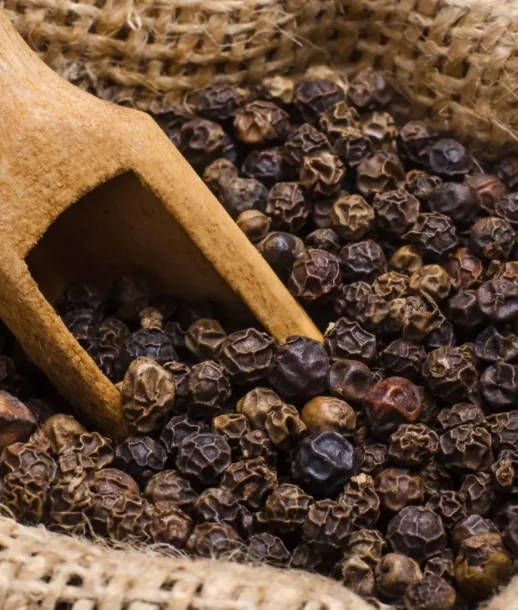Black pepper is a spice that is made from the dried unripe fruits of the Piper nigrum vine. It is one of the most popular spices in the world and is used in a variety of cuisines. Black pepper has a sharp, biting Flavor that is due to the presence of a chemical compound called piperine. Piperine is also responsible for some of the health benefits of black pepper, such as its ability to improve digestion and boost the absorption of nutrients.
Black pepper is native to India, but it is now grown in many tropical regions around the world. The fruits of the pepper plant are harvested when they are still green and then dried. The drying process causes the fruits to turn black and shrivel. Black peppercorns can be used whole or ground.
In India, black pepper is called “kali mirch”. It is a common ingredient in Indian cuisine and is used to flavor a variety of dishes, such as curries, chutneys, and pickles. Black pepper is also used in many other cuisines around the world, such as Chinese, Thai, and Italian.
In addition to its culinary uses, black pepper has also been used for centuries in traditional medicine. It is said to have anti-inflammatory, antioxidant, and antimicrobial properties. Black pepper is also used as a carminative, which means that it helps to relieve gas and bloating.
Here are some of the health benefits of black pepper:
- Improves digestion: Piperine, the active compound in black pepper, can help to stimulate the production of gastric juices and bile, which can help to improve digestion.
- Boosts the absorption of nutrients: Piperine can also help to increase the absorption of nutrients from food, such as vitamins A, C, and E.
- Fight cancer: Some studies have shown that black pepper may have anti-cancer properties. However, more research is needed to confirm these findings.
- Relieve pain: Piperine may also help to relieve pain, such as joint pain and headache.
- Improve cognitive function: Some studies have shown that black pepper may help to improve cognitive function, such as memory and attention. Overall, black pepper is a safe and versatile spice that has a number of health benefits. It can be enjoyed by most people as part of a healthy diet.
Black pepper is a flowering vine that is native to the Malabar Coast of India. It is now grown in many tropical regions around the world, including Vietnam, Indonesia, Brazil, and Sri Lanka. The Fruits of the pepper plant are harvested when they are still green and then dried. The drying process causes the fruits to turn black and shrivel. Black peppercorns can be used whole or ground.
The botanical name of black pepper is Piper nigrum. It belongs to the family Piperaceae, which is a family of flowering plants that includes over 3,000 species. Other spices that belong to this family include white pepper, pink peppercorns, and cubeb.
Black pepper is one of the most popular spices in the world. It is used in a variety of cuisines, including Indian, Chinese, Thai, and Italian. Black pepper has a sharp, biting flavor that is due to the presence of a chemical compound called piperine. Piperine is also responsible for some of the health benefits of black pepper, such as its ability to improve digestion and boost the absorption of nutrients.
Botanical description :
- Black pepper is a perennial climbing vine that can grow up to 30 feet long.
- The leaves are alternate, oval-shaped, and about 2-3 inches long
- The Flowers are small and white, and they are arranged in spikes.
- The fruits are small, round berries that are about 0.2 inches in diameter. They
- are green when they are young, but they turn black when they are ripe.
- The black peppercorns are the dried fruits of the pepper plant.
Chemical constituents of Black Pepper include:
- Piperine: Piperine is the main active compound in black pepper. It is responsible for the pepper’s sharp, biting flavor. Piperine also has a number of health benefits, including improving digestion, boosting the absorption of nutrients, and reducing inflammation.
- Volatile oils: Black pepper contains a number of volatile oils, including limonene, beta-pinene, and caryophyllene. These oils give black pepper its characteristic aroma.
- Flavonoids: Black pepper contains a number of Flavonoids, including quercetin and kaempferol. Flavonoids are antioxidants that can help protect the body against damage from free radicals.
- Saponins: Black pepper contains a number of saponins, which are compounds that can help to improve digestion.
- Alkaloids: Black pepper contains a small amount of alkaloids, including piperine, chavicine, and piperettine. Alkaloids are compounds that can have a stimulating effect on the body.

